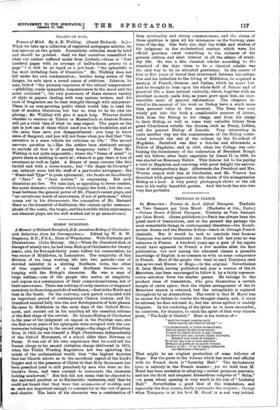BISHOP DURNFORD.
A Memoir of Richard Durnford,D.D.,sometime Bishop of Chichester: with _Selections from his Correspondence. Edited by W. R. W. Stephens, B.D., F.S.A., Dean of Winchester. With Portraits and Illustrations. (John Murray. 16s.)—When Dr. Durnford died, at the age of ninety-two, he had been Bishop of Chichester for twenty years; and, for five-and-thirty years before his consecration, he was rector of Middleton, in Lancashire. The simplicity of this division of his long working life into two periods—one of devoted ministry in a stirring Northern town, the other of wise supervision of a rural Southern diocese—is in keeping- with the Bishop's character. He was a man of large outline,—one of the people who arrive at simplicity and repose as a consequence of their comprehensiveness, not of their narrowness. There was nothing of rusty inaction or stagnant monotony in these long periods of residence,—first inithe North and then in the South. On the contrary, each period coincided with an important period of contemporary Church history, and Dr Durnford entered fully into the new developments of both phases. He came to Middleton in the early days of the Oxford Move- ment, and carried out in his ministry all the essential reforms of the first stage of the revival. He became Bishop of Chichester in the year of the judgment on appeal in the Parches case, and the first seven years of his episcopate were occupied with the con- troversies belonging to the second stage,—the stage of Ritualism. Born in 1802, he was himself a High Churchman independently of the Oxford Movement, of a school older than Newman or Pussy. It was out of his own experience that he could tell his Sussex clergy in his second visitation charge (delivered in 1875, when the Public Worship Regulation Act was agitating the minds of the ecclesiastical world) that " the highest doctrine that our Church allows as to the sacrificial aspect of the Lord's Supper and to the presence of Christ in that Holy Sacrament has been preached (and is still preached) by men who wore no dis- tinctive -dress, and were content to consecrate the elements looking southward." But this did not mean that he objected to the eastward position or to Eucharistic vestments, only that he could not forget that they were but accessories of worship, and as such not important enough to contend for at the cost of peace and charity. The basis of his character was a combination of deep- spirituality and strong common-sense, and the stamp of these qualities is upon all his utterances on the burning ques- tions of the day. One feels also that the width and wisdom• of his judgment in the ecclesiastical matters which were his official province owed something to the richness of his general culture and alert interest in all the affairs of every- day life. He was a fine classical scholar according to the standard of the days when to be a classical scholar was the only way to be an educated gentleman. In the course of four or five years of travel that intervened between his ordina- tion and his induction to the living of Middleton, he acquired a mastery of French, German, and Italian, which he never lost. And he brought to bear upon the whole field of Nature and of practical life a keen natural curiosity, which, together with an excellent memory, made him, as years grew upon him, an inex- haustible mine of general information. The chapters de- voted to the account of his work as Bishop have a much more than personal value at this moment. The Dean has very wisely put into the book a considerable number of letters, both from the Bishop to his clergy, and from his clergy to their Bishop, as well as some very valuable letters from greet Churchmen outside the diocese, such as Pusey, Liddon, and the present Bishop of Lincoln. Very interesting in quite another way are the reminiscences of the Bishop contri- buted towards the end of the volume by the Pr, sident of Magdalen. Durnford was first a Scholar and afterwards a Fellow of Magdalen, and in 1838, when the College was cele- brating the bicentenary of the restoration of President Hough and his fellows after their expulsion by James II. in 1688, he was elected an Honorary Fellow. This honour led to his paying a visit to Magdalen and renewing with great delight the associa- tions of undergraduate days. Afterwards the President and Mrs. Warren stayed with him at Chichester, and Mr. Warren has described with great appreciation the charm of the nonagenarian Bishop as a host. A very pretty photograph shows us the old man in his really beautiful garden. And the book has also two very fine portraits.


















































 Previous page
Previous page